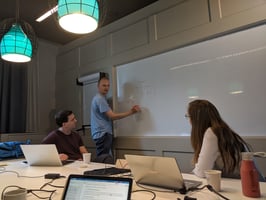"No longer the sleeping giant of the construction world, configuration software has stormed the...
Green Premiums in CPQ
Personally, I think the sustainability topics currently presented in the CPQ community are not very compelling.
Sure, we can talk about customers selling products like wind turbines and heat exchangers, or we can visualize environmental impact in various forms. But it doesn’t change the fact that most manufactured goods will have a substantial negative impact on CO2-equivenent emissions. Just knowing how big this impact is will not make that big of a difference.
In our presentation last week in Vienna we talked about changes in the heavy vehicle industry and how the configurator can help sales build valid business cases with radically better sustainability. We need to get emissions to net zero within one or two decades and this requires a shift in technology. CPQ can be a very good catalyst in this process.
Bill Gates talks about Green Premiums in his book “How to avoid a climate disaster”. This explains what it means: “This is an example of a Green Premium: The average retail price for a gallon of jet fuel in the United States over the past few years has been around $2.22, while advanced biofuels for jets cost around $5.35 per gallon. The Green Premium is the difference between the two, which is $3.13, or an increase of more than 140 percent.” If prices for biofuels come down to $2.22 there is no Green Premium and the shift will happen just based on a good business case. Once we use advanced biofuels, or electro fuels, aviation would be CO2 neutral – assuming the biofuels are produced with sustainable energy.
What happens if we apply green premiums to the heavy vehicle industry? Switching from fossil fuels to electric/hybrids/fuel cells/hydrogen currently comes at a higher investment cost, but it typically decreases fuel cost. For specific use cases the Green Premium is actually negative already, meaning it’s the most economical choice. This means the change will happen, just like we see with electric cars today. CPQ should help building the business cases for this change – one truck at a time.
So, if we’re going to talk about sustainability, I think marginal reductions must be ignored. We must aim higher, and we have the capability to really make a difference. In industries with an upcoming technology shift we can really make a difference. That’s were we should put our main focus.
If you have any questions or any idea how we can support you, send us message or let’s discuss it in a meeting.




